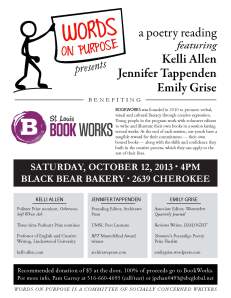Founder of Architrave Press and Wordsmith Extraordinaire Jen Tappenden tagged me in The Next Big Thing blog hop — a handful of questions for emerging writers that are making their way around the writerly corners of the internet. Be sure to check out her answers. And here are my own!
What is the working title of the book?
Peel Yourself Like Fruit — a line from the poem “Nerves,” which opens the collection.
Where did the idea come from for the book?
Time and circumstance. I’m at a point, having recently finished my MFA, where I feel I have enough work — enough decent work, thanks to the feedback of my writing family — to shape a book, and enough work to reveal the patterns in voice and style and content that help the shaping process along. And I feel ready to put something book-length out there. Maybe. Probably. Maybe. Yes.
What genre does your book fall under?
Poetry. A mix of narrative and lyric, with perhaps a bit more of the former.
What actors would you choose to play the part of your characters in a movie rendition?
Oh dear. The book is rather densely-populated, so I fear the production costs of hiring established actors to play most of the key roles would make a movie rendition prohibitively expensive. Or with a cast like that of a Wes Anderson film. If we’re not locked in to having real actors play roles, I think I’d cast the parents from Calvin and Hobbes as my own parents; the resemblance is uncanny.
What is the one sentence synopsis of your book?
“These poems exhibit a hunger to connect with the self and the world as well as a discomfort at the vulnerability which that connection entails — thus, a world view of extreme ambivalence: a tug-of-war between past and present, desire and loss, body and mind, family and self.”
(I love the magic of the em-dash. Did I cheat? I may have cheated.)
How long did it take you to write the first draft of the manuscript?
The oldest poem in the collection dates back to 2005 or 2006, I think, but that’s the date of its birth, not the date it actually felt like a poem. (Ugh, they never feel done.) So from one angle, it’s taken me about 7-8 years to produce enough work that felt book-worthy. From another angle, it took me about 8-9 months to shape that work into a cohesive manuscript.
Who or what inspired you to write this book?
Probably a sense of discomfort, of dis-ease. Things Amiss tend to snap me awake and out of the daily patterns it’s all-too-easy to sleepwalk through, and often that wakefulness brings with it more input — more stimulation — than I know what to do with. For me, poetry comes out of that hyper-vigilance as a way to both explore and make manageable that which unsettles me (for better or worse).
What else about your book might pique the reader’s interest?
I don’t disown the subjectivity of my work, nor the poems’ personal nature — that inextricable way that, while all writing is fiction, all the poems I write are also in some way a reflection of myself (even when I wish they weren’t). There are readers who are turned off by the bald-faced “I”, but I’d hope that a reader with an interest in finding where subjectivities overlap would have enough in this collection to sink their teeth into.
Will your book be self-published or represented by an agency?
I hope I can find a small press willing to give my poems a home.
One of my favorite writers who will answer these questions next week: Matthew Haughton, author of the recently-released book of poetry Stand in the Stillness of Woods (from WordTech).









